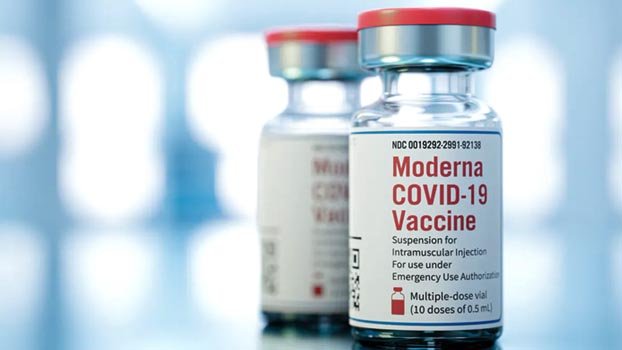3.6m Covid jabs arrive by tomorrow

Bangladesh will get 3.6 million doses of Covid-19 vaccine by tomorrow (Saturday) in a major development as the government is intensifying its nationwide inoculation drive due to the worsening situation of the coronavirus infection.
Health Minister Zahid Maleque would receive the first consignment of the Moderna vaccine at the Hazrat Shahjalal International Airport today (Friday).
Experts, however, urge people to maintain health and hygiene rules such as wearing masks, maintaining physical distancing and washing hands to prevent the spread of the pandemic coronavirus from person to person, even after getting vaccines.
“We don't know yet how long immunity lasts from the vaccines. And it also takes time to develop the immunity after getting a dose. So, we must be aware of that and wear mask to prevent the spread of the virus,” Dr ASM Alamgir, principal scientific officer of the government’s disease monitoring agency, IEDCR, told the Bangladesh Post.
According to the health ministry, the first consignment of 1.2 million Moderna doses will arrive at 11.20pm today while the second batch of 1.3 million will arrive on Saturday morning. Besides, 1.1 million doses of China’s Sinopharm vaccine will arrive at 12.30am after the first batch of the Moderna doses.
The health minister confirmed the development in a statement and said the Moderna doses would come from the United States under the Covax mechanism of the World Health Organisation and the Gavi Alliance.
The minister earlier in the parliament said that there would be no crisis of vaccine as Bangladesh would get 170 million doses of Covid-19 jabs by early next year.
Of them, 100 million would arrive by December and the rest would come by early next year.
“Through this, everyone who is eligible for vaccination will come under the vaccine programme,” he said in the parliament on Wednesday.
The government started nationwide vaccination drive in February with the Serum Institute of India’s Oxford-AstraZeneca Covishield brand vaccine. About 93 percent people who got two doses of the Covishield were found immune to the disease.
But the supply from the Serum under the purchase deal remained stopped due to the deteriorated Covid-19 situation in India.
The government is also exploring options to produce vaccine in the country to ensure immunisation for most of the people. Talks are underway with the Chinese and Russian makers.
With the Covax initiative, 100,000 doses of Pfizer vaccine have also come to Bangladesh. These vaccines are now being applied in a limited range in the country.
Earlier, on June 29, the Directorate General of Drug Administration (DGDA) approved emergency use of Covid-19 Moderna vaccine in the country.
The regulator has given Emergency Use Authorization (EUA) after all necessary examinations by the technical committee.
Bangladesh has so far approved eight COVID-19 vaccines to control the deadly disease.
These vaccines are Covid-19 vaccine of Moderna, Johnson & Johnson, "CoronaVac", manufactured by Sinovac Life Sciences Company Limited, Pfizer mRNA Covid-19 vaccine, Covishield produced by Serum Institute of India, Sputnik V manufactured by Generium Joint Stock Company of Russia, AstraZeneca manufactured by Sweden and Sinopharm produced by Beijing Institute of Biological Products Co Ltd of China.
Most of the jabs are two-dose vaccines. After one has been vaccinated, when does the immunity kick in and how long does it last?
WHO’s Dr. Katherine O'Brien explained: “After the first dose, we see a good immune response that kicks in within about two weeks of that first dose. And it's really the second dose that then boosts that immune response and we see immunity get even stronger after that second dose, again within a shorter period of time after the second dose. We don't know yet how long immunity lasts from the vaccines that we have at hand right now. We're following people who have received vaccinations to find out whether or not their immune response is durable over time and the length of time for which they're protected against disease. So we're really going to have to wait for time to pass to see just how long these vaccines last.”
“So, we really need to continue these (preventive measures) precautions while we're still learning about what the vaccines can do. Can they protect against getting infected and transmitting to someone else? And right now, we're in a situation where there's still very broad transmission in many countries, the transmission is just out of control,” she said.
“And so for how long we need to continue these precautions is really going to depend on what communities and countries can do to really crush this virus, to crush the transmission. And in that way, the vaccines can do their their best job at preventing disease. But remember that we don't actually have the evidence yet for using the vaccine in some age groups. We don't have the evidence for use of vaccines in children, for instance. So for the time being, those age groups are going to continue to be at risk of both disease and infection and being able to transmit to other people.
“The second reason is that the vaccines are in short supply, so we don't have enough vaccine yet out in the community to protect everybody. Those are the reasons why we have to continue the precautions, especially the masking, the physical distancing, the hand washing and not gathering in big groups. For how long we need to continue those those interventions? Time is going to tell. Once we get broad vaccination coverage in the community, when we know more about what the vaccine can actually do to prevent infection, and we can slowly start taking our foot off the pedal of these other interventions and make sure that the transmission, again, doesn't start to escalate again,” she said.



